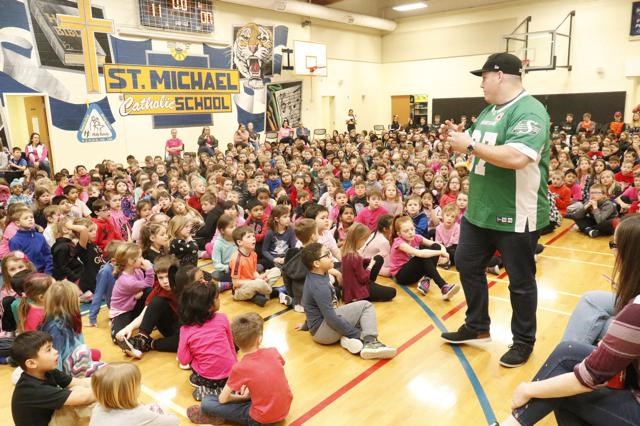Weyburn students were encouraged to help make their schools safe and welcoming, to stand up for those who are bullied, and to help bullies also, in a talk by Roughrider veteran Dan Clark on Friday.
He spoke as part of the Pink Shirt Day concerts at St. Michael School in the morning and to the public school elementary schools gathered at the Cugnet Centre in the afternoon, with Sask Express also appearing at both events to promote anti-bullying initiatives.
Clark said it all starts with healthy friendships, and by being respectful to each other in school, noting in his talk at St. Michael that he observed this to be true there.
He stood at the door to welcome the students and staff as they came in, and told the group in observing them that they laughed and smiled a lot, which goes a long way to making a school feel safe and welcoming.
The centre for the Riders talked about being on a professional football team, and also about his own experiences with being bullied as an elementary and junior high student.
Like a school, he and his team-mates are all from different backgrounds and beliefs, but “we establish that healthy friendship. What helps on our team is we need to get along, and that starts with the nine of us (on the offensive line). I try to welcome every team-mate. Will I be with every single team-mate for the rest of my life? Absolutely not, but as long as I can, I can extend a welcome to the team.”
Clark gave an example of Charleston Hughes, who had played for the rival Calgary Stampeders for a long time before the Riders signed him.
“Were we particularly nice to each other on the field? No, but when we signed him, it was chance to meet a new friend,” said Clark, who noted they greeted each other as fellow players, acknowledging they knew about each other.
“At the time, I was 29 and he was 33. I made another grown man feel welcome and safe in an environment where he didn’t know where his place would be after playing against the Saskatchewan Roughriders for so long, and that establishes a trust in our locker room every single day,” said Clark. “That’s how it should be in your schools, in your community, in everything you do.”
Sharing some of his own experience with bullying, he told the students from when he was in Grade 4 up to Grade 8, he was made fun of constantly.
“I was bullied every single day. I’ve always been a big student, so I was teased about my size. In that situation, I dealt with verbal bullying,” said Clark, adding, “It was very hard growing up. I tried different ways home, I tried to find myself a good friend. It hurt my confidence.”
One bad experience was about two weeks before the end of his Grade 8 year, out on the soccer field, when a bully hit him in the face with a pylon. It hurt his face as well as his feelings as all the students went back into the school as if nothing happened, and when the teacher asked him he came in later than everyone else, he lied and said he had to chase the ball over the fence.
“Why did I say that? Because I was scared that it would continue to happen,” said Clark, pointing out that this was “the worst thing that I could do.”
When things finally turned around for him was when he began high school, and the high school coach and one of their star players came up and introduced themselves to him and invited him to try out for the sport. One of his teachers called over to the high school and said Clark would be a good fit on the football team.
“In a matter of 10 or 15 seconds, I had that safe and welcoming feeling,” he said.
Clark said one of the big lessons he learned from all of these experiences is, “it doesn’t matter what colour you are, how tall you are, how big you are, how smart you are, when all of you students come together, anything is possible.”
If any of the students are bystanders and sees someone being bullied, he said, they should help that student, if they feel safe in that situation.
“When you want to stop bullying, you have to feel safe to stop it,” said Clark. “The biggest thing is that you have that support system. You have older students, you have teachers that can help you.”
He then asked the students if the bully should be helped, and a few said no, because they are mean.
“The main thing I’ve learned from the Red Cross is that a bully is about what you do, not who you are. Something at home could be affecting the bully. Maybe there’s an older student or somebody at home, or a team-mate or someone they look up to who is acting that way. Maybe there is something in their life that’s going on,” said Clark, adding that if this is true, “We want to get help for the bully. We want to get help for anyone in need.”
His final word of advice was, “In a world where you can be anything, be kind.”




